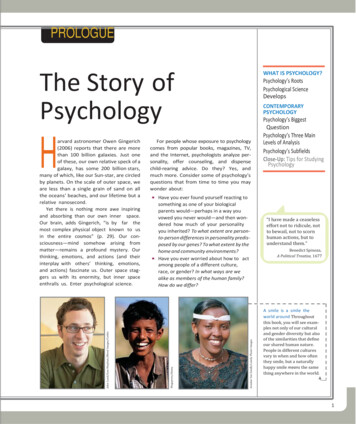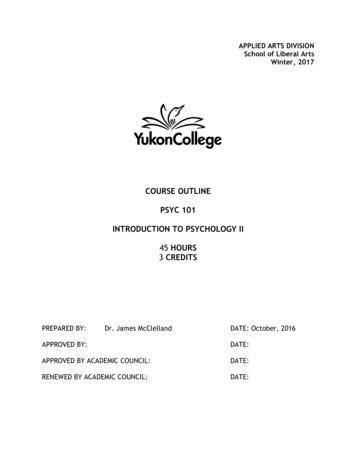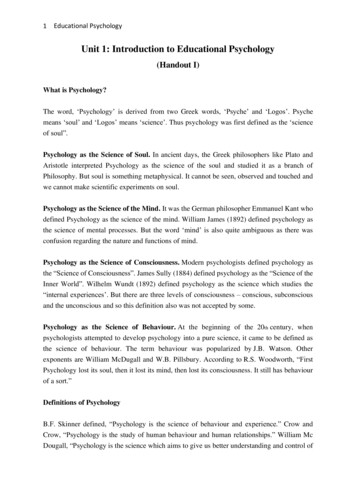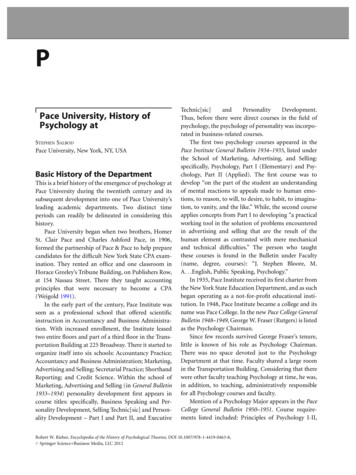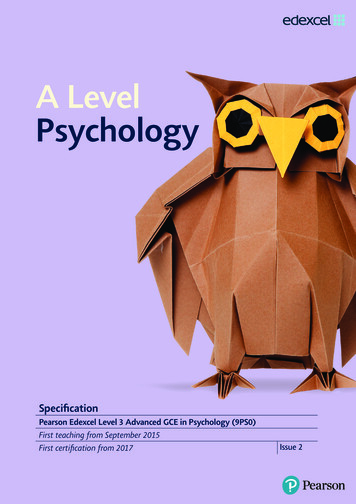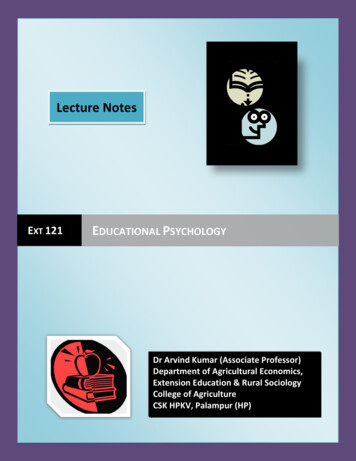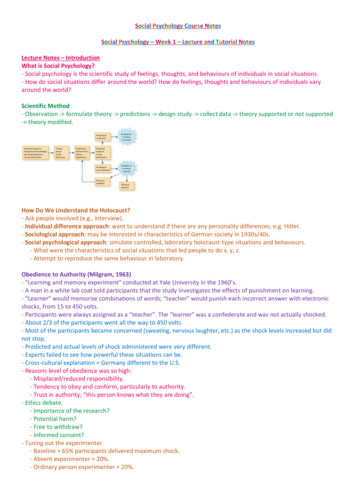
Transcription
wellcoaches psychology manual
1FUNDAMENTALS OFCOACHING PSYCHOLOGYMargaret Moore, Bob Tschannen-Moran, Gloria Silverio,and Lori Gray Boothroyd"I saw an angel in the stone and carved to set it free."-MICHELANGELOWelcome to the Wellcoaches Coaching Psychology Manual. This manual is designed to teach basic coachingskills and processes. When we use the term "coach"throughout the manual, we are referring to healthcoaches, fitness coaches, and wellness coaches.AFTER READING THIS CHAPTER,YOU WILL BE ABLE TO: Distinguish among wel lness, health, and fitnesscoaches Distinguish among business, life, wellness, fitness,and health coaching Explain why we need professional coaches inphysical and mental wellness Distinguish between coaching and the expertapproach of health and fitness professionals Define coach ing and identify the value of the coach/client partnership Understand the key components of coachingpsychology Describe the process of coaching Distinguish between coaching and therapy Outline the Professional Coach Code of Ethics Define liability and scope of practice guidelinesWHAT IS COACHING?Coaching is, to quote W. Timothy Gallwey, "the art ofcreating an environment, through conversation and away of being, that facilitates the process by which a person can move toward desired goals in a fulfilling manner" (2000, p. 177). When those goals have to do withhealth, fitness, and wellness, coaching becomes a vehicle for assisting people to achieve a higher level of bothphysical and mental well-being.To create such an environment, coaches use evocative more than didactic approaches with clients. We domore listening than talking, more asking then telling,and more reflecting than commenting. Coaching is notadvising clients on how to solve problems, nor educating clients about what they should do, nor analyzingthe root causes of client predicaments. Although advising, educating, or analyzing problems are on occasiona part of coaching, they are neither the primary purposenor approach of coaching. Coaches are collaborativeand co-creative partners in clients' journeys to reachtheir visions and goals.Distinguishing among Well ness, Health,and Fitness CoachesWellcoaches has clarified the scope of three coach typesin the health, fitness, and wellness arena.3
4PA RT I Core Coaching SkillsWellness coaches are credentialed health, fitness,and mental health professionals (including personal trainers, cardiac rehabilitation specialists,dietitians, health educators, physical therapists,nurses, physicians, and behavioral health therapists) who coach clients on evidence-basedareas of wellness-physical activity, nutrition,weight, stress, and life satisfaction. While wellness coaching has a broad scope, coaches provide expert guidance and advice w hen calledfor and where clients lack expert knowledge,only in the areas where they have professionalcreden tials.Health coaches are credentialed healthcare professionals (including nurses, nurse practitioners,physician assistants, clinical exercise physiologis ts, and physicians) who combine coachingwith their expert knowledge to assist theirpatients and clients to manage medical conditions such as heart disease, diabetes, arthritis,and cancer.Fitness coaches are credentialed exercise professionals (including cardiac rehabilitation specialists, exercise physiologists, certified personaltrainers, and group exercise instructors) whouse coaching skills to enhance personal training and fitness instruction outcomes. Fitnesscoaches wear both the training and coachinghats to help clients fully develop healthylifestyles outside of exercise sessions.Distinguishing among Business, Life,Wellness, Health, and Fitness CoachesCoaches today are becoming highly specialized intheir areas of expertise. Corporations may hire executive coaches or business coaches to improve the performance of their executives or managers. Individualsmay hire life coaches to navigate their way througha life transition (e.g., career changes or retirement) orto improve their qu ality of life, management of time,or sense of life passion and purpose. There is no limitto the diverse niches and specialties that coachesoffer.Although some life coaches offer health or wellness coaching, their perspective is often centered moreon aligning personal goals and values with improvingwell-being than on motivating and designing healthpromoting, evidence-based mental and physicalbeh aviors in the areas of fitness, nutrition, weightmanagement, health risk, stress management, and lifesatisfaction. Wellness, health, and fih1ess coaches assistclien ts to connect the dots between who they are andwho they want to be, and to take the incremental behavioral steps that will enable them to succeed in theirdesired changes, leading to a higher level of health andwell-being. Our coaching drills down to gritty basicseven as it aspires to great heights.DON'T FORGET .Because coaching psychology principles are relevant to all forms of coaching, including wellness,health, and fitness as well as business and lifecoaching, throughout the remai nder of this manual the word "coach" will be used inclusively. It'sall about assisting clients to "move toward desiredgoals in a fulfill ing manner."WHY WE ALL NEED COACHINGEven though this manual was written for coachesworking with clients, we all share the need for partnerson the journey if we hope to be healthy and well. Evencoaches need coaches to be our best selves.While most of us long for better physical and mental well-being, considerable evidence suggests thatwe're moving in the opposite direction. Consider thisparadox. Despite continuous media attention devotedto healthy lifestyles, there are now more overweightpeople than undernourished people worldwide (WHOFact Sheet, 2006). The situation in the US is particularlyserious. A recent study shows that Americans are significantly less healthy and more overweight than Brits atthe same age and socioeconomic level (Banks, Marmot,Oldfield & Smith, 2006).Why do we have this paradox? Although obesityis a multifactorial problem, at least four factors lead usto unwisely choose quick fixes that don't last, and thisjeopardizes our confidence-what psychologists referto as self-efficacy (Bandura, 1997). First, there are thedemands of everyday life, which have never beengrea ter. Second, we face a bewildering array of wellness guidelines, products, and services, making it difficult to create a personal formula. Third, there is thechallenge of navigating the inevitable obstacles tomaking changes, including confusion, resistance, andambivalence. Fourth, many of us have histories ofrepeated failure. Most of us do not believe that we canmaster our weigh t and welh1ess.We want to be well. We yearn to be in control ofour health and to feel better. We want more energy.But there is an enormous gap between wanting to bewell and the everyday reality of living with the physical and mental health consequences of overeating,under-exercising, and having too little down-time torecharge our batteries.The evidence is indisputable. Being fit, strong, andhaving a healthy level of body fat are safe and effective
CHAPTER 1 Fundam entals of Coaching Psychologybreakthrough medicines that help prevent and treatalmost every affliction studied, including mental health.A quote from Tal David Ben-Shahar, Professor of Positive Psychology at Harvard University, is notable: "notexercising is a depressant."Coping well with stress and increasing life satisfaction (e.g., a sense of purpose, gratitude, and meaning) are joining exercise and eating well as "lifestylemedicines." Two-thirds of healthcare costs are drivenby our daily choices (Institute of Medicine, 2006)-weare in the driver's seat. But knowledge is not enough.Only one in twenty adults engage in all of the top-sixhealth behaviors (Berrigan, 2003): regular exercise,healthful fat intake, at least five servings of fruits andvegetables daily, limited drinking, non-smoking, andmaintaining a healthy weight.Getting people to optimal wellness is at the forefront of today's hopes and dreams of physical andmental health professionals. This is the first time inhuman history where being in control of one's healthand making health investments day in and day out arepoised to be dominant societal themes, just as smokingcessation was two decades ago, or sacrificing for thegreater good was during World Wars I and II.We need to learn a new life skill: developing a personal blueprint for well-being and becoming confidentin our ability to implement it. Most of us don't believewe are able to master this life skill; the increasing numbers of those who choose bariatric surgery represent theface of our greatest doubts (Elfhag & Rossner, 2005).The health and fitness industry has been workinghard to help us. Never before have there been moreexperts, assessments, resources, guidelines, technology, books, web tools, and beautiful high-tech facilities.The wellness revolution is underway (Pilzer, 2002),with a welcome new emphasis on enabling long-termbehavior change or "changing for good" (Prochaska,Norcross, & DiClemente, 1995). New interventionsfocus on assessing readiness to change for each healthbehavior and then tailoring interventions and education to match readiness.While all of these resources are valuable, we needmore. We normally ask experts to tell us what to do,and this approach isn't ideal when we have low selfefficacy (Joos & Hickam, 1990). Experts are trained todeliver prescriptions and advice, and they often workharder than we do in trying to help us. But the expertapproach actually lets us off of the hook, sending thesubtle message: You aren't in charge.The expert approach is vital when we are facing animmediate health crisis or considering surgery.It is notideal when we want to lose weight, reduce stress, ordevelop a positive and confident mindset. Delega tingto experts comes with a price: we are not in control andwe are not asked to work to find our own answers.5Building confidence requires new patterns of thinking,doing, and relating.We also need a shift in emphasis to our strengthsand opporhmities, building on what's working in ourlives and away from an emphasis on diagnosing andfixing what's not working. The more we focus on thelatter, the more we undermine self-confidence.lt makesit harder, not easier, to change when we focus on what'swrong and what's not working. Not enough positiveenergy and emotion are harvested to fuel the pursuit ofchange.Moreover, we need to take a holistic view of healthand well-being. Specialists who work in only one area,such as exercise, nutrition, or mental health, withoutknowledge of or reference to the others are destinedto have limited effectiveness or even to cause harm.These areas are intrinsically intertwined and are mostsuccessfully dealt with all together. Most people needassistance to integrate information from multipleexperts to decide what actions to take and how to prioritize them. People find it confusing when expertscontradict each other. It is certainly not a recipe forpromoting the "I can do it!" attitude.There are two other important things we need.First, without a heartfelt higher purpose, there is rarelydeep and lasting change-we need to connect wellness,health, and fitness to what we value most. Second, weneed to develop a wellness, health, and fitness behavioral plan that is personally tailored to our circumstances and capacities.Professional coaches have long been recognized for theirskills in helping athletes, sports teams, and executives perform at their best. Now, professional coaches are assistingclients to make lasting improvements in their health andwell-being.The emerging professions of wellness, health, and fitness coaches are designed to enable people to be done withquick fixes, to overcome their challenges, to master healthand well-being, and to make changes that last.With a focus on building self-efficacy, professionalcoaches are trained to: accept and meet us where we are today; ask us to take charge; guide us in doing the mindful thinking, feeling,and doing work that builds confidence; help us define a higher purpose for health andwell-being; uncover our natural impulse to be well; help us tap into our innate fighting spirit; address mental and physical health together; assist us to draw a personal wellness, health, orfitness blueprint; help us set and achieve realistic goals (small victories lay the foundation for self-efficacy);
PART I Core Coaching Skills6 harness the strengths we need to overcome ourobstacles; reframe obstacles as opportunities to learn andgrow; enable us to build a support team; and inspire and challenge us to go beyond what wewould do alone.WHAT COACHING ISN'T:THE EXPERT APPROACHCoaching is an especially powerful methodology whenit comes to stimulating individual behavior changebecause it is focused on helping clients grow intobecoming the experts of their own well-being. Coachesdo not show up as experts who primarily: analyze problems,give advice,prescribe solutions,recommend goals,develop strategies,teach new skills, orprovide educa tion.Although such expert approaches are appropriate in acoaching relationship, they are used "just in time" andonly rarely. In the coach approach, the client is calledto become the decision maker and grow into theexpert on the path forward as well as the final judge ofsuccess. The goal of coaching is to encourage personal responsibility, deep thinking, self-discovery,and self-efficacy. We want clients to find their ownanswers and o create their own possibilities rather thanto be given answers or direction by the coach. Clientoriginated visions, plans, and behaviors are the onesthat stick.It can be difficult for health and fitness professionals, who have been trained extensively as experts andwho are armed with large quantities of authoritativeknow ledge and written rna terials to support their expertstatus, to take off the expert hat and shift to the coachapproach. In many cases, it can also be difficult forclients to see and to work with their coaches in a different way, because they have long been conditioned to betold what to do rather than to take charge of their ownhealth and wellness and self-change. It is a challengefor coaches and clients alike to come from a new framework, but when the shift is made the transformationsfollow.Using the coach approach, rather than the expertapproach, coaches generally don't direct the client'sgoals and strategies (although they do guide the coaching process). Instead they engage in coaching inquiries,asking powerful and insightful open-ended questions(What? How?) rather than closed-ended questions (Doyou? Will you?). They use reflections to mirror back tothe client what they are hearing (You're feeling unhappyabout your life balance. You want to have more energy.).And they listen, listen, and listen with empathy andcuriosity.Coaches engage the minds and hearts of clients byassisting them to discover their strengths, to clarifytheir values, to increase their awareness, to set their priorities, to meet their challenges, to brainstorm possibilities, and to design positive actions. Such engagementenables clients to generate a new self-concept (who is mybest self? ), to create new supports and enviromnents(what supports my best self?), and to take new actions(what manifests my best self?). By empowering clients tofind their own answers, through asking non-judgmentaland provocative questions and offering powerful reflections, coaches become catalysts for lasting change.In transitioning from the expert to the coachapproach, many report the challenges as well as therewards of: Asking questions with a beginner's mind-notassuming that they already know the answers. Not making decisions and judgment callsquickly, but allowing clients the chance to godeeper and get to important stuff. Not thinking about what to say next, but insteadlistening for the thread hanging off of a client'slast words. Not generating quiet resistance with even a hintof know-it-all energy. Reading, respecting, and working with clients'emotions as the guideposts to truth. Not rushing clients through their "muck," butinstead compassionately helping them sit thereuntil the desire to change gains energy. Not being on "automatic pilot" to ensure that achecklist gets completed, but instead being fullypresent to the client's reality.These and many other shifts, described in this manual,represent the practical side of coaching psychologythat can assist people to successfully master the healthand wellness challenges of the present day.Integrating the Coachand Expert Approaches"Less is more" is a good rule of thumb for coaches whenit comes to teaching and advising. Certainly it is important for coaches to step in when clients are doing or planning to do things that will endanger their health, fitness,or wellness (such as over-exercising, exercising unsafely
CHAPTER 1 Fundamentals of Coaching Psychologywhen injured, not following a physician's prescription,sharing medication, or following an unhealthy diet fora lengthy period). It is also important for coaches toNOT step in to advise on areas outside their areas ofevidence-based competence and professional expertise.Coaching is no place for amateur advice.It is always a judgment call as to how and when tobring expert advice into coaching. The following considerations can assist coaches to know whether theyare on the right track:1. Make sure clients are working at least as hardas you are.2. Make sure clients are talking more than you1are.3. Make sure clients first try to find the answersfor themselves.4. Ask permission to give expert advice, if youfeel it is appropriate, so that the client is still incontrol. Brainstorm two to three choices withthe client so that the client is the informeddecision maker.5. Speak less and speak simply-only one question or reflection at a time.6. At every turn in the session, stop and considerhow to use the coach approach (inquiry Ireflections) with the client before going to theexpert approach.7. Balance questions with reflections so that clientsdon't feel like they are being interrogated.8. Use silence to elicit deeper thinking.9. If clients confirm that they need to acquirenew knowledge and skills to reach their goalsand visions, help clients define the path togaining the new knowledge and skills, withinput from other experts when needed.wellness. It's both more fun and, in many cases, moreeffective to stay with discovering possibilities andenvisioning the future rather than resolving problemsand revisiting the past.Therapists who make the shift to coaching oftenreport a higher sense of satisfaction and self-efficacyin their coaching work than they experienced in traditional psychotherapy. Indeed, the growing demandfor coaching services suggests that clients also enjoythe coach approach and see it as an effective modalityfor handling the common challenges of life (Williams& Davis, 2002).In addition to the energy lift that comes from thestrength-based focus that coaches follow, clients alsoappreciate the holistic approach that coaches take tohuman well-being. Most people who struggle withwellness face intertwined psychological and physicalchallenges that lead to ambivalence or chronic contemplation. However, therapists generally don't work onthe physical side of the equation (such as designing anew eating regimen or exercise habits). Understandingthis, coaches seek to work holistically with all aspectsof well-being.When coaches work on supporting a higher level ofwell-being, the new science of positive psychology isproving to be an invaluable resource. Through appreciative inquiry and strengths-based conversations,coaches are often able to assist clients to develop selfacceptance, a positive mindset, self-efficacy, more happiness and life satisfaction, as well as the strengths ofcourage, resilience, and tenacity. The exploration of positive emotional energy leads to breakthrough insightsand galvanizes action.Even those with significant health and wellnesschallenges, such as morbid obesity, re.spond to thecoach approach to set a new path for both personalgrowth and managing weight.WHAT COACHING ISN'T:THE THERAPY APPROACHJust as coaching is different from the expert approach,so, too, it is different from therapy. One major difference is that therapy treats diagnosable disorders basedon the Diagnostic and Statistical Manual of Mental Disorders 4th Edition (DSM-IV), which includes all currently recognized disorders in mental health. Coachingdoes not diagnose and does not work with people suffering from clinical dysfunctionality. Coaching workswith people who are already doing some things well intheir lives and who wish to do better or to develop inother dimensions.That may be why many therapists are leavingpractices that focus on pathology and illness to becomecoaches and counselors who focus on strengths and7IMPORTANT!While the coach approach supports positive mental and emotional functioning, in some casespsychological wounds go too deep or humanfunctioning is too severely compromised bypsychopathology to respond to coaching. Whenthis happens, it quickly becomes self-evident(often from an initial assessment, see Chapter 7)and it is time to either refer a client to therapy orto work in tandem with a therapist. Here, too, it isimportant for coaches to not work with clientsoutside their areas of evidence-based competenceand professional expertise.
PA RT I Co re Coaching Ski ll s8WHAT IS COACHING PSYCHOLOGY?WHAT IS COACHINGPSYCHOLOGY?Coaching psychology is th e science of coachingrelationships designed to optim ize health andwe ll-being, found ed upon evidence-basedtheo ri es and fields.Mas terin g wellness, health, or fi tness and developing the con fiden ce to su stain o ur w ell-being is ajo urney of personal grow th. Coaching delivers a newgrow th-promo ting relation ship design ed to h elp usm as ter o ur well-being . A professional coach is ourpar tn er in definin g "Point B" and co-designing andco-navigating the journey to ge t there through coaching sessions, typ ically for three months or lon ger.Coach es don ' t m ake it easy for us by giving thean swers; they facilita te our self-d iscovery and forward momentum.The emerging industry of professional coaching,w hich began nearly twenty years ago, has until recentlyfoc used on life, corp ora te, and executive coaching.Dozens of life and corp orate coach training schools andacademic p rograms have trained more than 20,000coaches worldwide. Recently health, fi tness, and wellness coach training programs have emerged .Coaching psychology is vibrant and creative. Today,coaching psychology integra tes more than 15 theoriesand academic fields. A fo un dation for coaching psychology research is being built by psychologists and professional coaches in several countries.The outcomes delivered by coaches include: Increased self-awareness and self-knowledgeAcquisition of new knowledge and skillsAttainment of person al and professional goalsSustainable beh avior chan geIncreased life sa tisfactionIncreased self-efficacyBecoming one's bes t selfOne's best self includes high self-esteem, w hich isthe belief tha t one has value and self-worth, as well asself-efficacy, which is the belief that one has the capability to initia te or sustain desired behaviors (see Chapter 6) . These behaviors may supp ort a general sense ofwell-being or they may be related to sp ecific areas ofhealth and fi tness. In wha tever way these beh aviorsmay be identified by the client, it's the job of coaches tohelp people become more confident, energized, positive, and powerful, and to make las ting chan ges.Three key componen ts of coaching psychology usedby professional coaches are values, relational skills, andcoaching processes, evidence-based where possible.ValuesDrawing on humanistic p sychology (Stober, 2006),coaches believe that clients are w hole (not broken andneeding to be fixed), crea tive, resourceful, resilient,and able to gain control of health, fitness, and wellness.We are often out of touch with these abilities.Skilled coaches believe that we are able to figureout what we want and need, and to find our way,given a safe, non-judgm ental, challenging, and invigora ting space. This space enables the thinking and feeling work we do to support self-determination. Alignedw ith Michelangelo's quotation "I saw an an gel in thestone an d carved to set it free," coaches help us chipaway at layers of clutter to reveal "m y bes t self."Valuing the client's learning process more than theyvalue their own exp ert knowledge, coaches help clientsbroaden and build their stren g ths (see Ch apter 4).Coach es know tha t they d on ' t know many of theanswers, and they hold a curious beginner's mind.Relational SkillsRelational skills enable coaches to engage, arouse, energize, and ch allen ge clients to do the work need ed tosupport desired outcom es. They include n ot only"doing" skills such as listening, inquiry, and reflections(see Chapter 2) but also "being" skills such as mindfulness, empathy, authenticity, affirmation, courage, zest,calm, playfulness, and warmth (see Chapter 11). Takentogether, these skills enable coaches to build and sustain a close relationship and p ar tnership with clientsthat promote learning and grow th.To master these relational skills, coaching p sych ology draws on a w ide variety of domains, theories, andmodels including rela tional cultural theory, counseling p sychology, appreciative inquiry, nonviolent communica tion, and m otivational interviewing (Moore,Tschannen-Moran, Drake, Ca mp one, & Koffman ,2005). These will be described throughout this manual.Rela tional skills enable coach es to radia te theenergy, to exude the confidence, and to sh·ucture coaching conversa tions so that clients come to believe theycan ge t w here they want to go. Without self-efficacy,no real learning and grow th is possible.Coaching ProcessesCoaches employ a variety of coaching processes, oftengrounded in eviden ce-based theories. This manua l
CHAPTER I Fundamentals of Coaching Psychologymakes clear the indebtedness of the coaching profession to other significant bodies of knowledge and practice. Coaches draw widely and freely from the manyassessments and approaches that foster a sense of purpose, the formation of a personal vision, the creation ofplans, as well as the setting and reaching of goals.The Transtheoretical Model (see Chapter 3)describes the stages of readiness to change, inspiringcoaching processes suited to each stage. When we arestruggling with weight or other wellness issues, we canbe helped up the "readiness" ladder. For example, wecan move from pre-contemplation (I am not ready to thinkabout making a change any time soon) to contemplation (Iam thinking about making a change in the next six months)to preparation (I am preparing to make a change next week).Other bodies of knowledge that impact coachingprocesses include appreciative inquiry, nonviolent communication, motivational interviewing, social cognitivetheory as well as a number of therapy practices suchas cognitive behavioral therapy (Burns, 1980), realitytherapy (Glasser, 1990), choice theory (Glasser, 2001),and positive psychology (Peterson, 2006). All these aredescribed in this manual to assist coaches to create aunique experience for each client that will assist them tolearn, grow, and move forward in the direction of theirdesired goals.In the end, however, coaching is not about followinga formula . It is about the following the client in an intuitive dance known as relational flow (Moore et al.,2005). In moments of relational flow (the best generativemoments; see Chapter 9), both coach and client arehighly engaged, awake, challenged, and stretched to theouter edges of their abilities. During relational flowclients grow in front of our eyes, and forward leapsoccur.WHAT BRINGS CLIENTS TO COACHING?Although people come to coaching for their ownunique reasons, 12 themes are commonly cited byclients when they make the decision to invest in working with a wellness, health, or fitness coach.1. Quick Fixes Over-"I'm done with quick fixesand want to make changes that last."2. Precious Asset-"I have decided that health ismy most precious asset and I'm ready to investfor the long term."3. Get Off the Fence-"I am fed up with sitting ona fence and want to commit to a wellness path."4. Not About Weight-"I realize that it's aboutwellness and not weight."5. Be the Boss-"I want to be the boss of my healthand wellness and quit delegating responsibilityto others."96. Health Style-"'' d like to develop my uniquehealth style rather than use one-size-fits-allapproaches."7. Mental Game-"I know what to do and nowwant to master the mental game, turning intention into reality."8. Peak Performance-"! recognize that to reachpeak performance at home and work I needpeak wellness."9. Big Picture/Small Steps-"I know that anextreme makeover isn' t the answer and I wantto take small steps that are powerful."10. Confidence-"I'm finished with self-doubtand want to build confidence in m y ability tomaster wellness."11. Winning the Wellness Game-"I want to focuson winning the wellness game and not losingor quitting."12. Close the Gap-"I want to close the gapbetween where I am and where I want to bewhen it comes to my health and well-being."THE PROCESS OF COACHINGThis manual describes the Wellcoaches process ofcoaching in detail. It serves as an excellent startingpoint for new coaches and evolves as coaches expandtheir tool boxes. In broad strokes, however, coachingprogresses through several stages: Before and during the first coaching session clients provide background informationthrough a comprehensive assessment, so thatcoaches are well-informed on the priorities, keyissues, and any medical limitations. Increasingself-awareness is an important
COACHING PSYCHOLOGY Margaret Moore, Bob Tschannen-Moran, Gloria Silverio, and Lori Gray Boothroyd "I saw an angel in the stone and carved to set it free." Welcome to the Wellcoaches Coaching Psychology Man ual. This manual is designed to teach basic coaching


